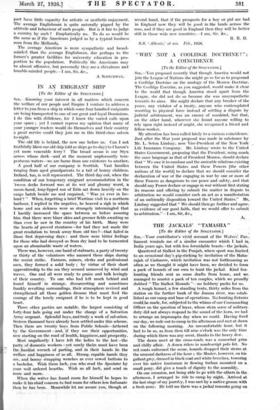" WHY NOT A COOLIDGE DOCTRINE ? " : A
COINCIDENCE [To the Editor of the SPECTATOR.] SIR,—You proposed recently that though America would not join the League of Nations she might go so far as to propound a Coolidge Doctrine on the analogy of the Monroe Doctrine. The Coolidge Doctrine, as you suggested, would make it clear to the world that though America stood apart from the League, she did not do so because she was unsympathetic towards its aims. She might declare that any breaker of the peace, any violator of a treaty, anyone who contemplated resorting to physical force instead of settling a dispute by judicial arbitrament, was an enemy of mankind, but that, on the other hand, wherever she found anyone willing to rely upon right instead of might, she recognized a friend and fellow-worker.
My attention has been called lately to a curious coincidence. Just after the War your proposal was made in substance by Mr. L. Seton Lindsay, now Vice-President of the New York , Life Insurance Company. Mr. Lindsay wrote to the United States Government, proposing that the President, using much- the same language as that of President Monroe, should declare that " We owe it to candour and the amicable xelations existing between the United States and these Powers [the other nations of the world] to declare that we should consider the declaration of war or the engaging in war by one or more of these Powers as dangerous to our peace and safety, and that should any Power declare or engage in war without first stating its reasons and offering to submit the matter in dispute to arbitration we would consider such an act as a manifestation of an unfriendly disposition toward the United States." Mr,. Lindsay suggested that " We should then go turther and agree. as evidence of our good faith, that we would offer to submit, to arbitration."—I am, Sir, &c.,
A, ,






















































 Previous page
Previous page